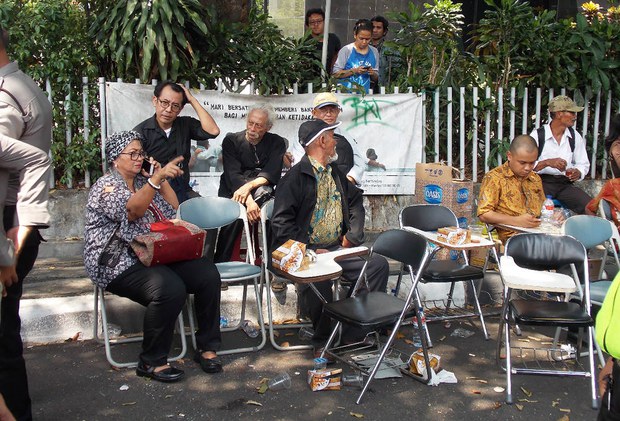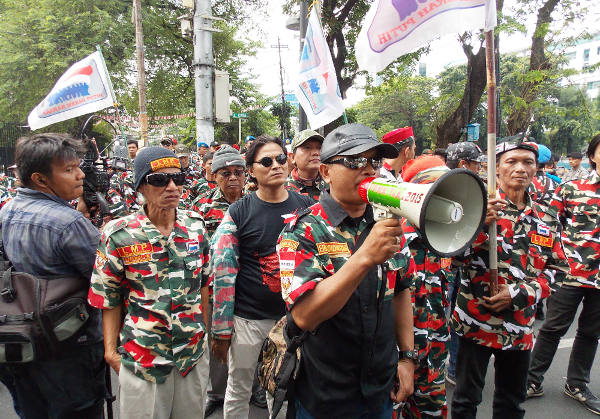Indonesia: Mob Attack in Jakarta Tied to Fake News Condemned
2017.09.18
Jakarta
 Survivors of the 1965-66 anti-communist purge gather in front of Indonesian Legal Aid Foundation headquarters in Jakarta, Sept. 16, 2017.
Survivors of the 1965-66 anti-communist purge gather in front of Indonesian Legal Aid Foundation headquarters in Jakarta, Sept. 16, 2017.
Updated at 1:30 p.m. ET on 2017-09-19
Indonesian activists expressed concerns Monday about fake news after a mob attack injured five police officers in central Jakarta late on Sunday.
Police fired tear gas and arrested 22 people when rioting erupted as dozens of people were staging an art performance at the headquarters of the Indonesian Legal Aid Foundation (YLBHI) and the Jakarta Legal Aid Institute (LBH), officials said.
The activists were presenting a performance, “Asik Asik Aksi,” an artistic expression of democracy in the form of music and poetry, on Sunday evening when a violent mob gathered outside the YLBHI and LBH offices. Organizers said the performance was meant to be a protest against police who stopped their seminar a day earlier.
The seminar was tied to political and social upheaval that occurred 52 years ago when bloody anti-communist purges swept Indonesia, according to event organizers. But police officials said it was stopped because organizers had not applied for a permit.
About 50 people, who were wearing paramilitary uniforms and claiming to be Laskar Merah Putih (Red and White Warriors), from demonstrated on Saturday, accusing the performance participants of being supporters of the outlawed Indonesian Communist Party (PKI).
The incident was triggered by fake news that went viral on social media and described the event as an effort to revive PKI, according to YLBHI chairwoman Asfinawati.
“It is clear that a hoax or fake news was published, false propaganda went viral, calls to attack the LBH were conducted systematically,” Asfinawati said in a joint statement with Jakarta LBH.
“It went viral that this was a PKI event … but in fact, it was no such thing,” the statement said.
Azriana, chairwoman of Komnas Perempuan (National Commission on Violence Against Women) condemned the violence and urged police officials to hold those accountable.
“Act firmly against those who mobilized the masses to commit destructive actions, who play off one against another in the community and politicize the situation that triggered tension,” she told a news conference.
Accusations that participants were holding an event to support the long-disbanded PKI were baseless, Azriana said.
Metro Jaya Police Chief Idham Azis said the incident was under investigation.
“We do not know who mobilized the masses,” he told reporters.

About 50 people who claim to be members of Laskar Merah Putih protest outside the YLBHI building in Jakarta, Sept. 16, 2017. (Ismira Lutfia Tisnadibrata/BenarNews)
Communism outlawed
At least 500,000 Indonesians died during a nationwide anti-communist purge that targeted suspected PKI members in 1965 and 1966, leading the government to declare communism illegal in the country.
YLBHI said police watched Sunday’s performances and acknowledged they were not related to PKI.
Muhamad Isnur, chairman of YLBHI’s advocacy division, said about 130 people were in the building when the performance came to an end following disruptions from hundreds of protesters.
Participants were evacuated to the National Human Rights Commission (Komnas HAM) building about 2 kilometers (1 mile) from YLBHI office.
The activists thanked Jakarta police for protecting people trapped in the building.
Other cases of fake news
Indonesia has had its share of fake news stories, including stories aimed at President Joko “Jokowi” Widodo and former Jakarta Gov. Basuki “Ahok” Tjahaja Purnama, an ethnic Chinese Christian who was convicted and jailed over comments deemed insulting to Islam.
In a Facebook posting last week, Jokowi said he had been asked by international leaders about social media in Indonesia. He said he responded by saying it was cruel, suggesting that mainstream media could be controlled but not social media.
“This is the openness we are facing and we must all be ready,” he said, warning that social media could also be used to spread slander, vilify and blame others and spread fake news.
On Sunday, The Straits Times reported that a police investigation confirmed the existence of a “fake news factory” against political targets in Indonesia.
The syndicate, known as Saracen, can charge millions of rupiah to publish and spread fake news or hate speech. The going rate for a quick-hit fake news story is 75 million rupiah (U.S. $5,650), the newspaper said.
This updated version clarifies what took place on Saturday and Sunday.







